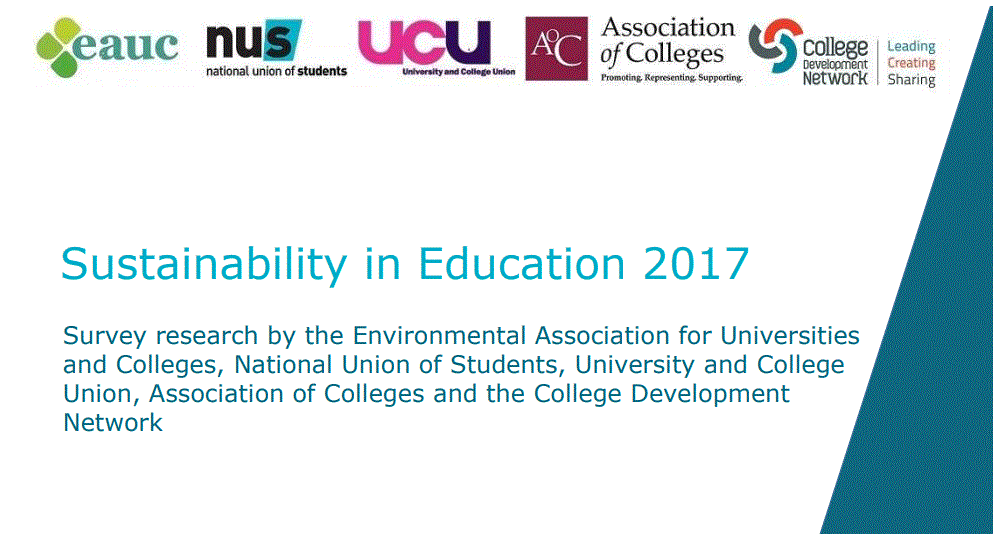University and College leaders recognise sustainability as priority but fail to deliver
Sustainable Education sector report 2017 from the National Union of Students (NUS), Environmental Association for Universities and Colleges (EAUC), University and College Union (UCU), Association of Colleges (AoC) and the College Development Network (CDN).
The research shows 1 in 3 respondents reported sustainability as a strategic priority for the institution they work at, up 7% from 2016, yet only 1% of respondents felt their institution was doing all it could to progress environmental and social responsibility. These findings are reflective of the broader societal shift in understanding of the importance of sustainable development and the role everybody has in delivering this. However, they also show sustainability in Higher and Further Education is prevented from meeting its full potential by the lack of resources dedicated to the effort in many institutions.The average budget dedicated to sustainability has reduced, with 71% of respondents expecting the 2017/18 budget to stay the same or decrease further. There is a clear disconnect between strategic and financial priorities in Further and Higher Education.The research is based on a sample of 500 staff members from universities, colleges and students’ unions in the UK, with 63 respondents identifying as lead staff members on environmental sustainability and social responsibility in a formal or informal basis.
Key findings:
- Only 1% of respondents felt their institution was doing all it could to progress environmental and social responsibility.
- 71% of respondents expect the 2017/18 budget to stay the same or decrease further.
- The report showed a large divide in resource capacity between Higher and Further Education. While half of the lead sustainability staff in Further Education spend 10% of their time focused on sustainability, two thirds that work in Higher Education spend 100% of their time focused on sustainability.
- Despite the UK-wide focus on carbon reduction and its necessity, 13% of Higher Education institutions reported they do not have a carbon reduction plan.
- 75% of respondents have reported that their institution has progressed action linked to the United Nation’s Sustainable Development Goals (SDGs) initiative. This was the biggest motivator of the initiatives listed.
- Though estates and facilities departments still tend to lead on environmental sustainability and social responsibility, the responsibility is starting to spread into other departments, with significant increases in leadership from commercial services, finance, and communications and marketing departments, as well as students’ unions.
- The biggest barriers facing institutions on this topic were; 1) Finances, budgets and budget cuts; 2) Lack of senior management commitment and strategic direction and 3) Lack of staff resources.
- Looking forward into 2017-2018 and beyond, the most important agenda within environmental sustainability and social responsibility to the respondents was climate change, CO2 reduction and carbon management.
20180109_state_of_the_sector_report_2017_final
Iain Patton, CEO at the Environmental Association for Universities and Colleges (EAUC), said:
The research we have released today shows a sector striving to lead the way in best practice for a sustainable society, but being held back by a lack of financial resource and executive level understanding. We know from our own experiences with members that when institutions have a real passion for sustainability and social justice, and do not have these obstacles, there is no limit to their innovation and forward-thinking. We would urge those in executive level positions in the post-16 education sector to take the time to meet with their sustainability staff, get to grips with how sustainability can benefit their institution financially, socially and environmentally, and start to put their money where their mouth is. They must do this to deliver their own strategy, but they also have a responsibility as educators to create a new and engaged generation that see sustainability as the norm and can balance people, planet and prosperity.”
